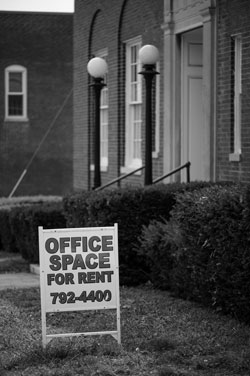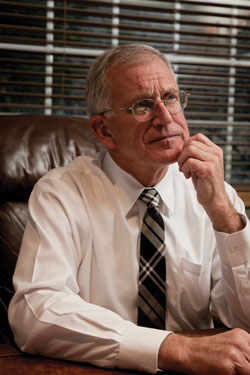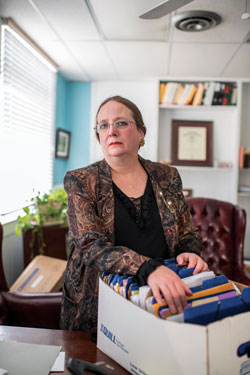Death of a Practice: After Lawyer Dies, Her Friend Is Faced with Closing Down Her Firm

The Law Office of Diane Denniston: Finding new tenants for the space where Denniston practiced may be the least vexing of the many matters that need to be addressed after her death last August. Photo by Earl Richardson.
Sole practitioner Diane Denniston lived her last days in the dining room of fellow Missouri attorney Alicia Beeler Villines this past summer.
A Kansas City-area lawyer of more than 20 years, Denniston had expected to return to her home, as well as to her clients, when she was diagnosed with cancer for a second time in 2011.
“Diane was a warm and caring person,” says Villines, whose practice is in Kearney, about 25 miles north of Kansas City. “I had met her at a bankruptcy CLE, and she became a close personal friend over the past few years.
“Diane had realized her cancer had returned, but her doctors were perhaps not as forthright as they might have been. … Since late last year, she had been operating under the assumption that her health problems were more temporary and she would be able to return to the practice of law as she did after her first battle with the disease in 2005.”
From a hospital bed, Denniston requested that Villines close down her practice. “When Diane realized that the recurrence of her cancer was going to result in her death in the near future, she turned over her cases to me, signing an agreement to allow me to close her cases and transferring her practice over to me,” Villines says.
Soon after, Denniston learned that her situation was even more complicated. “Because Diane’s health insurance did not cover nursing home care, she needed a place to go where she could live out her final days under hospice care. Diane had no family.
“I wanted to do what I could for a friend. So I converted my dining room, complete with hospital bed and other sundry medical equipment. I hired temporary help so I could care for Diane, do my own client work and transition Diane’s clients.”
Though her practice area is also bankruptcy, it was not until she was able to dig into Denniston’s case files that Villines realized there was too much for one attorney.
“I shuffled out other types of cases with which I was less familiar to other colleagues of hers, but the bankruptcy portion of Diane’s practice encompassed a substantial number of cases, all of which were in various stages of emergency,” she says. “I worked my way through them as quickly as I could, but the sheer volume made it impossible to bring all of them to a current status immediately. Since there was little or no money left to glean and much work to be done, they were hardly attractive commodities, and so parceling them out didn’t seem very feasible either.”
Villines reached out for assistance. The bankruptcy trustees overseeing Denniston’s cases were understanding, “but I still needed help because of the emergency nature of so many of her cases.” Fortunately, when some local women who practiced bankruptcy law heard of Denniston’s terminal illness and Villines’ plight, they pitched in.
“There were 18 cases to hand off for representation on a pro bono basis. I am really grateful to those women bankruptcy attorneys who helped out. If they hadn’t volunteered, I’m not sure what I would have done.”
A month after Denniston’s death in August, Villines still had much to sort through because there was little time to plan once Denniston realized her death was near. “The end result was that as it got nearer to the end of Diane’s life, no one told her how close she was to dying, so she took on cases and clients as if the cancer was temporary,” recalls Villines. “If she had known she was going to die in such a short period of time, Diane would have done things differently.”

Diane Denniston, 1982.
Denniston’s story, heart-rending as it is, is unique only because it highlights Villines’ rare brand of friendship.
No matter how many cases won, honors bestowed, dollars earned or clients saved, lawyers are not insulated from becoming victims of untimely deaths.
Denniston’s personal tragedy forced her to spend the precious last days of her life making a plan for winding down her practice. Villines endured emotional, financial and physical sacrifice. But consider what happens when there is zero time for advance planning, and no friend like Villines:
• A single 20-something running a virtual office dies in a mountain-climbing accident. The distraught parents are receiving phone calls from their child’s clients. With no experience or knowledge of the legal profession, the parents have no way of knowing how to deal with clients who want their files. They are grieving and unable to return calls or find the information the clients need.
• A well-respected attorney dies in a motorcycle accident. The clerk of the court sends letters to all clients the attorney was listed as representing. But most of those clients are in prison, waiting for the attorney to complete their appeals. Worse, the clients have drained their savings to pay the attorney’s retainer. With hearing and statute-of-limitations dates fast approaching, the clients are unable to obtain new counsel without somehow recovering the unused retainer needed to pay the new counsel.
• A widow is grief-stricken. Her breadwinner spouse died suddenly, leaving her with five young children—along with seven file cabinets full of confidential business and client records lacking any instructions about what she is supposed to do with them.
“These stories are a typical workweek,” says Lainie Hammond, custodianship counsel for the Washington State Bar Association. “I’m the person who gets called when an attorney dies without a plan.”

Steve Crossland: “Even when you have a plan, chaos can result if the details haven’t been put in writing for winding down a deceased attorney’s practice.” Photo by Amanda Kostler.
PROBLEMS WITHOUT A PLAN
A plan, however, is exactly what a lawyer’s fiduciary duty requires. Though a legacy of chaos is not what most attorneys hope to leave behind, when a solo or small-firm practitioner dies without a plan in place, the legal burden for clients and loved ones is great.
Steve Crossland of Crossland Law Office in Cashmere, Wash., knows firsthand that when the unthinkable happens to an attorney without written instructions for closing a practice, chaos is the result.
“Clients are the biggest losers when a lawyer dies without a plan,” he says, “because there are statutes of limitations, hearing deadlines and the like that can expire with no retroactive remedy—other than a potential malpractice claim, of course, against the estate, if there is any—which means that then the deceased lawyer’s loved ones may pay the price.”
The immediate-past president of the Washington State Bar Association, Crossland also chaired its task force on attorney succession planning. “Even when you have a plan, chaos can result if the details haven’t been put in writing for winding down a deceased attorney’s practice.”
As in most business relationships, confusion and ethical dilemmas can be avoided by having a well-written agreement in place between the attorney who is selected to assist and the planning attorney—also referred to as the “affected attorney”—who is making the plan for closure.
“It’s really important for the assisting lawyer and the affected lawyer to discuss the details of what role the assisting lawyer is to play in the event of death or incapacitation,” Crossland says.
First and foremost, identify who exactly the assisting attorney is intended to represent: the interests of the affected attorney or the interests of the affected attorney’s clients. Crossland offers the questions to discuss:
“Transitioning clients to other attorneys—for example, what information about the affected attorney can be revealed to clients? How deep into the client file can the affected attorney go for purposes of protecting client confidentiality, especially in a small community where everyone knows each other or each other’s family? Another consideration is that in smaller regions there may not be many attorneys. From a potential conflict of interest, you’ve got to ask yourself whether you can really take on the affected attorney’s clients as your own given your current and former clients.”
Professional liability is another potential conflict-of-interest situation where the importance of clearly defining the attorney-client relationship is key. For example, if the assisting attorney discovers malpractice or misappropriation of client funds while transitioning active cases, whose interest is the assisting attorney supposed to protect? Defining the relationship dictates whether the assisting attorney has a duty to report the error to the client, as well as the assisting attorney’s own ethical duties.
When ambiguity surrounds the attorney-client relationship, case law suggests that courts typically apply the viewpoint of what would be the reasonable belief of the client whose matter was being transitioned.

Alicia Beeler Villines: “If she had known she was going to die in such a short period of time, Diane would have done things differently.” Photo by Earl Richardson.
PUT IT IN WRITING
Barbara Fishleder, executive director of the Oregon Attorney Assistance Program, says that “giving the transfer agent, often referred to as the assisting attorney, written permission to contact your clients for instructions on transferring their files and authorization to notify people of your office closure are some of the things you will want to cover.”
Protecting clients’ interests and confidentiality in the event of the lawyer’s death or incapacitation also protects loved ones from exposure. With no plan, Fishleder says, “expect bewildered and stressed clients who, one, frantically want their file in order to protect their legal interests and, two, need their retainer back from your trust account so that they can get another lawyer.
“As the empathy and patience of your clients diminish and their legal needs become more acute, their concerns may end up taking the form of professional malpractice claims for missed deadlines, claims filed against you or your estate for a refund of their retainer, or even ethics complaints,” she says.
Fishleder notes that “every lawyer’s situation is different, as is the situation—and skill set—of the helpers they enlist.”
Some lawyers find that it is best to have someone assigned as their “file triage captain,” and someone else to take responsibility for winding down the business affairs.
“The most important thing you can do after you write down … passwords is to find someone who will serve as your file triage agent. In many cases, it can be the person that you shared the passwords with,” Fishleder says. “They will be the ones who look at your calendar to see which case matters require attention first. This system works best, of course, if you have an up-to-date calendar system.”
Villines’ experience shows why readily accessible, current information is necessary.
“I had to contact Diane’s former secretary for help in tracking people down,” she recalls. “Diane had an extensive Rolodex, but it had very few client phone numbers. Diane’s former secretary didn’t work for her for the last eight months of Diane’s life, but was still familiar with many of the clients. I think once a person has received a terminal diagnosis, he or she needs to keep some sort of assistant on hand who knows what’s going on.”
Moreover, when an affected attorney is diagnosed with an illness, Villines advocates asking the difficult questions that call for answers one may not want to hear.
“The fact that your doctor hasn’t told you ‘how long you have’ does not mean you have a long time, nor does it mean that [your doctor] doesn’t know. It may only mean that this medical professional believes the difficult conversation will take at least 20 minutes, the waiting room is full, and he or she would really like to get out of the office in time to watch his or her kid play soccer.”
IOLTA’S IMPORTANCE
Financial institutions usually have certain forms necessary for advance completion to allow another signatory, that is the assisting attorney, access to the funds held in interest on lawyers’ trust accounts. Hammond of the Washington State Bar says, “If you do nothing else, have another attorney who can sign on your account in the event of death or incapacitation.”
Otherwise weeks can be lost trying to obtain the appropriate orders for IOLTA access.
“When there’s no backup attorney authorized to approve IOLTA disbursements in the event of death or incapacitation, someone has to go through the process of getting motions filed for an order to direct the bank to release the IOLTA funds,” Hammond says. “The biggest problems arise with attorneys’ trust accounts because an order from the bar association disciplinary board for access to the IOLTA does not impress the bank. I spend four to eight hours at the bank trying to convince their legal department I have authority to access the deceased attorney’s IOLTA and make disbursements.
“At least with client files in litigation, documents might be re-created from a court docket. Without money, a client can’t hire a new lawyer to take the case.”
Ultimately, arrangements for accessing the IOLTA account serve another purpose for the affected attorney—protecting the deceased attorney’s loved ones from liability for a malpractice claim arising from a client who was unable to secure adequate representation because funds were held captive in the deceased attorney’s IOLTA. “The issue of how to get money returned to clients from the trust account is a difficult one,” Hammond says.
Fishleder echoes Hammond’s concerns: “Rules differ among states, so each lawyer should find out the applicable rules for adding a trust account signer, including if that person must be a lawyer. The benefit of allowing a second signer on the trust account is that your clients’ money will not be held captive.”
And do not make the mistake of assuming probate courts will handle access to the IOLTA. Hammond says that in her experience “probate doesn’t always address this because Washington Rules of Professional Conduct require an attorney as signer on an IOLTA account.”
A “payable on death” or “transfer on death” arrangement with the financial institution may be another option.
“A TOD/POD provision on all financial accounts allows control to continue after death,” Villines says. “A will and agreement on your computer that ‘just needs to be tweaked a bit’ is equal to not having a will. I couldn’t look at Diane’s bank account without her signing things first.”
TAKE THE TIME
“The very worst thing to do is nothing at all,” Fishleder says. “Many lawyers want to do things well and they don’t feel they have time to really tackle the project thoroughly. This is a giant misconception.”
In the age of technology, password knowledge is key. “It only takes five minutes to write down your passwords to your computer and phones and tell them to someone you trust. In those five minutes you have just made it possible for your trusted friend or family member to help your clients if you unexpectedly become ill or die. Even that one step—five minutes of your time—is huge.”
Still think you’re too busy? Consider that “the saddest situations we have seen are those where a lawyer suddenly is unable to practice or dies,” Fishleder says. “A common occurrence when a lawyer does not plan ahead is that the lawyer’s grieving and exhausted family, while trying to cope with the lawyer’s complicated health issues or their sudden tragic loss, is simultaneously slammed with pressing law practice-related questions posed by clients who need their file and their money to proceed with their case.
“Generally, the family members don’t have the answers and don’t have a way of getting an answer. It is an unfortunate situation for all and is never the way the lawyer hoped it would be. It was simply that they didn’t get around to taking even the smallest step of sharing passwords and establishing an assisting attorney or triage agent,” Fishleder adds.
And lack of assets does not excuse a lawyer’s fiduciary obligations.
“Some solo practitioners believe they don’t need a plan if they have no assets,” Hammond says. “Even if there aren’t client funds at stake, lawyers still have an obligation to take care of their clients’ confidential records. Otherwise the loved ones left behind get the calls from clients—sometimes really angry clients—and complaints from people wanting their files, and all the while the loved ones are coping with their own grief.
“Don’t do that to your family. Don’t do that to the people you leave behind. What you do to your family is personal.”
PRIORITIES FOR ASSISTING ATTORNEYS
Conflicts checks before undertaking the responsibility of winding down another attorney’s office are in order just as if receiving a client referral. Indeed, avoiding conflicts is key when the incentive to being an assisting lawyer is acquiring the affected attorney’s clients.
“This does work at times,” Fishleder says. “However, more often it turns into a quicksand of conflicts of interest that everyone is sorry they stepped into. If the assisting attorney is also going to take on representing the clients, many conflict-of-interest traps can raise their ugly heads, and often during a time the assisting attorney is grief-stricken and exhausted.
“He or she may be close to the ailing lawyer or recently deceased lawyer’s family, and may be helping them while also dealing with the demands of the lawyer’s panicked and/or grief-stricken clients and the demands of his or her own practice. These can be complicated and intense situations, and for these reasons it is best to separate representation from triage.”
Taking on only the responsibility of closing the practice helps avoid exposure to the ailing lawyer’s potential malpractice claims or ethics violations. “It also won’t be so complicated to screen the assisting attorney from common files,” Fishleder says, “if he or she practices in the same area of law. It isn’t always possible to separate these functions, but it is well worth it when possible.”
Crossland suggests that compensation be arranged. “Friends may not expect to be paid to wind down things for you if you die or become disabled, but it is a big job. You’re essentially going to be running two law offices for a month or two, and you need to make sure you get paid. You can take out a life insurance policy for this purpose and not have the assisting attorney have to rely upon accounts receivable.”
On average, expect to spend three months to wind down a deceased attorney’s practice. “It really is a triage approach,” adds Crossland. “There are things that have to be done the first week, the first month.”
Villines echoes those sentiments. “I’ve spent 10-hour days, seven days a week, working on someone else’s business.”
Of the 16 cases transferred to Villines’ firm for her representation, she received only a partial fee for two.
Crossland also offers advance planning as another way to separate you from other attorneys.
“Touching on the fact that you’ve planned ahead for the unexpected can show clients you care so much about serving their interests that you’ve made sure they’re taken care of whether [or not] you’re around.”
To do so, Crossland suggests “sometimes telling a client: ‘In the event of my death or disability, your needs are cared for and business will go on. If I don’t wake up tomorrow and you have to file, don’t worry. I care so much about you that I’ve gone to the trouble of planning to take care of you if I’m deceased or become disabled.’ ”
For solo and small-firm practitioners who love their families and care about their clients, a closing agreement with another attorney who will handle the details of shutting down the firm should the unthinkable happen is the way to show it.
DIY RESOURCES
Most states have rules and ethics opinions governing the appointment of attorneys to handle the responsibility of a deceased attorney’s cases and property. However, local and state bar association programs and resources for planning vary.
For example, in California the Contra Costa County Bar Association implemented its own program as a proactive measure.
“We periodically get calls from clients whose attorney has died and they need to get their files,” says Lisa Reep, the association’s executive director. “We used to refer them to the state bar, but learned the state bar couldn’t help as they don’t keep any information. So we discussed it at a staff meeting … and set up the transition program on our website.”
“If you’re a solo practitioner and another attorney cannot walk in and run your practice, you are leaving a mess for someone else,” says Villines. “And that’s really selfish.”
Other bar associations have adapted programs based on Oregon’s handbook, Planning Ahead: A Guide to Protecting Your Clients’ Interests in the Event of Your Disability or Death, to reflect their own state laws. The Washington bar credits the Oregon handbook in its online resources, including standard form letters and agreements, on the how-to’s of planning both for the assisting attorney and affected attorney.
And call your local or state bar association offices to learn about their available resources. Ask whether they have “practice management advisers that will come to your office or answer your planning-ahead questions over the phone.” Fishleder, who authored the Oregon handbook, adds that “if your state doesn’t have any resources, feel free to contact me and we will send you one of our handbooks.”
From one lawyer to another, Crossland urges: “Do it for your family, clients and staff.”
Sidebar
WHAT YOU NEED:
Maintain these documents in a binder and/or encrypted electronic folder as PDF or word-processing files in a secure location and confidentially protected manner:
• A copy of the financial institution’s form(s) for IOLTA access by the assisting attorney.
• A power of attorney authorizing the assisting attorney to run the business as needed, including as IOLTA signatory.
• A list of passwords for computer systems, and bank and other accounts.
• An up-to-date chart of all files for transitioning and closure.
• Instructions for loved ones and the personal representative of the estate about the designated assisting attorney responsibilities.
• Contact information for the designated assisting attorney.
• An updated list of law practice contacts (employees, clients, vendors, suppliers, memberships).
• A draft of a letter for the assisting attorney to provide notification to clients about the deceased lawyer.
• A draft of a letter from the assisting attorney to clients authorizing release of client files to a new attorney.
• The state bar’s client file retention rules.
• If state law allows attorneys to sell their practices, include instructions to the personal representative and will provisions corresponding to the duties concerning the closing and/or selling of the practice.
ETHICS TO CONSIDER
ABA Standing Committee on Ethics and Professional Responsibility Formal Opinion 92-369 (Dec. 7, 1992), Disposition of Deceased Sole Practitioners’ Client Files and Property, provides:
“To fulfill the obligation to protect client files and property, a lawyer should prepare a future plan providing for the maintenance and protection of those client interests in the event of the lawyer’s death. Such a plan should, at a minimum, include the designation of another lawyer who would have the authority to review client files and make determinations as to which files need immediate attention, and who would notify the clients of their lawyer’s death.”
Susan A. Berson, author of several finance and tax books for lawyers, is a partner with the Banking & Tax Law Group of Leawood, Kan.



